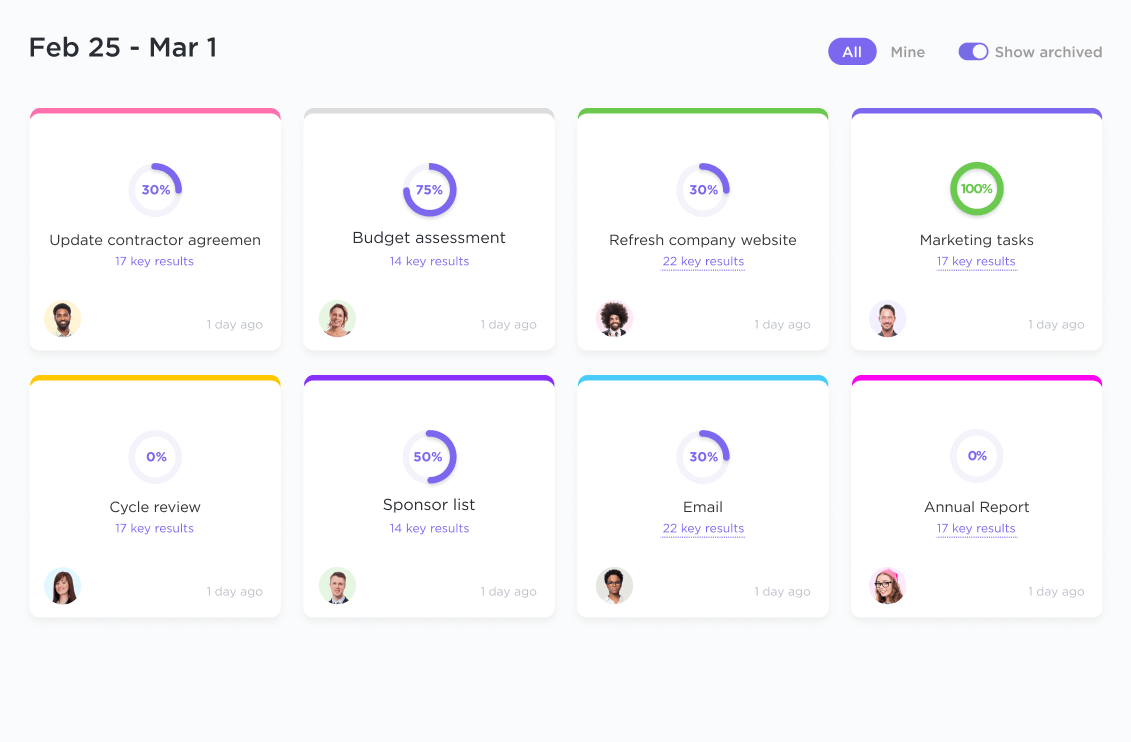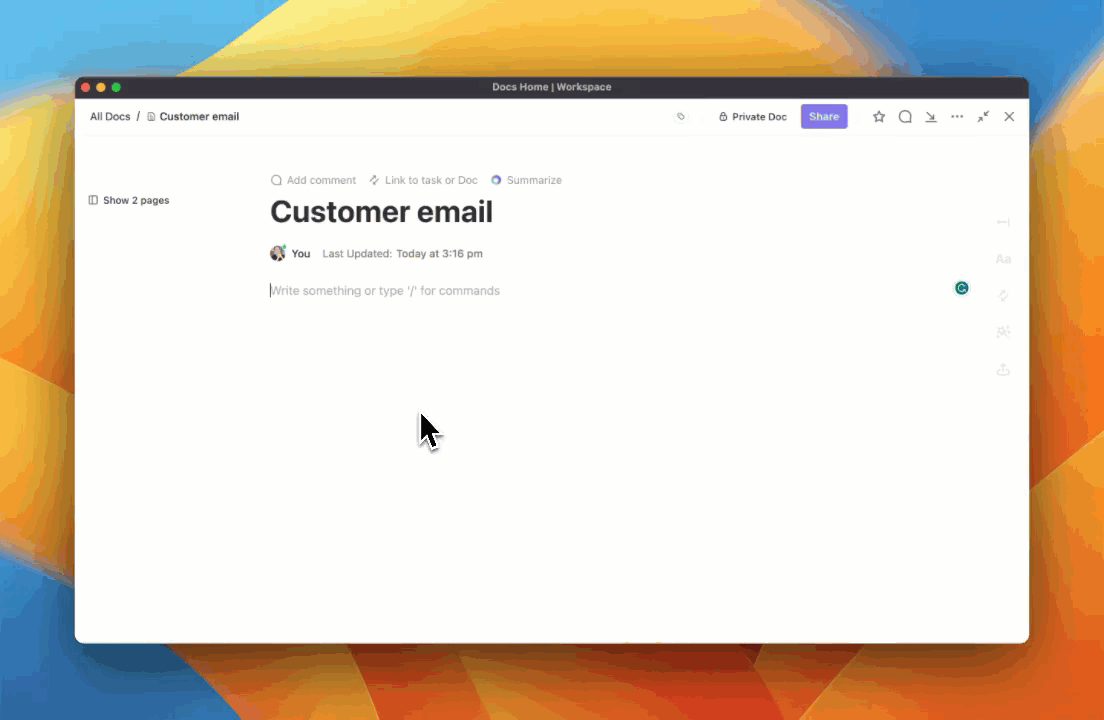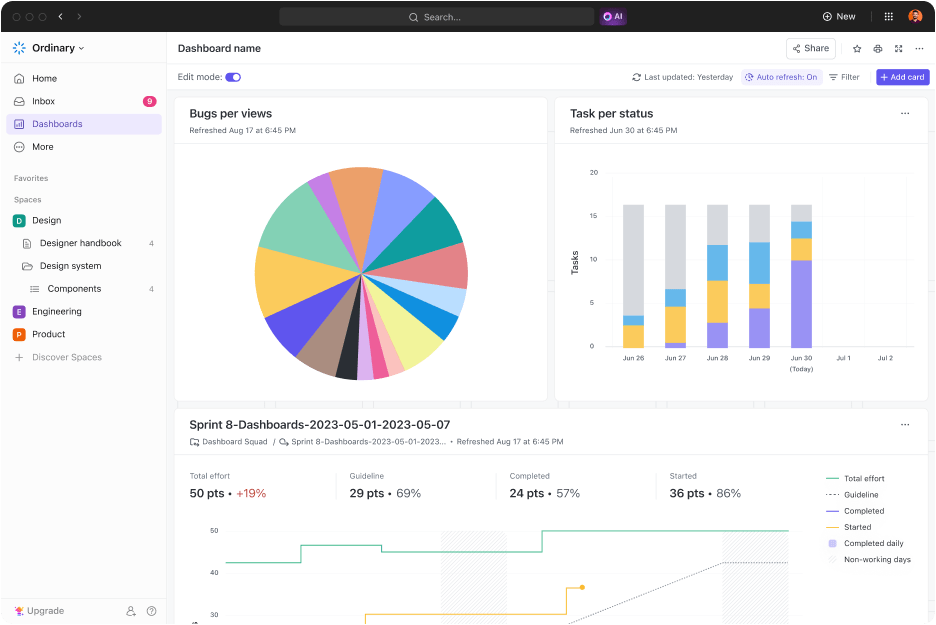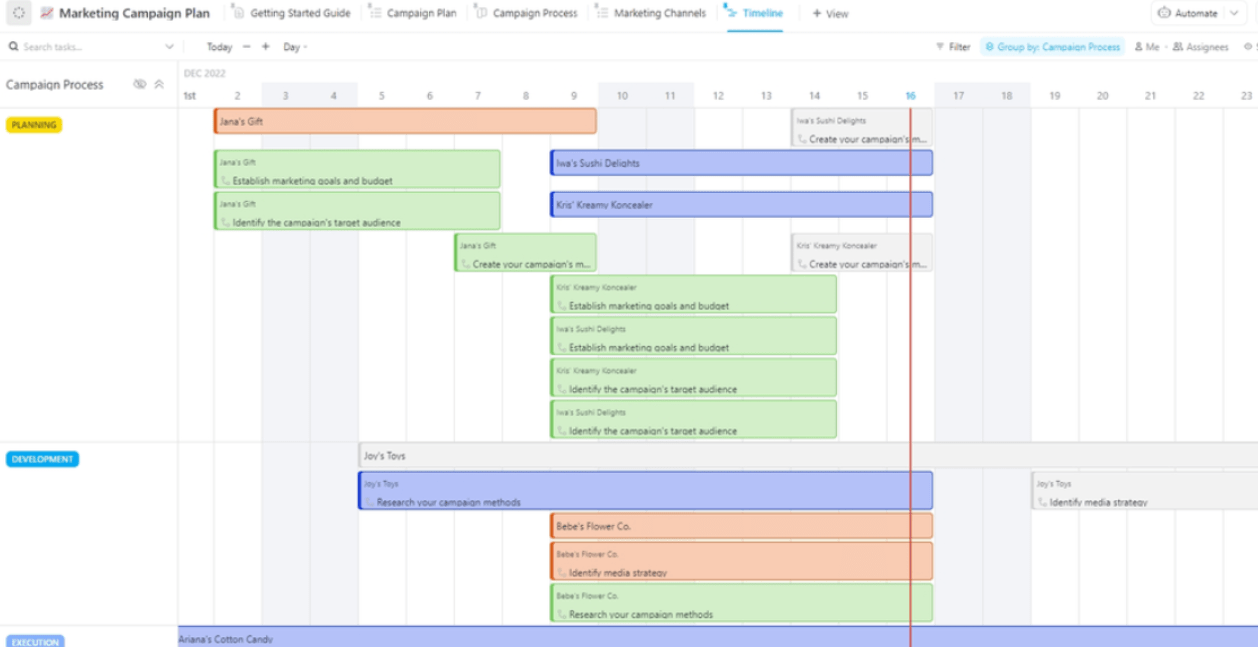

Sometimes, an idea that sounds great in the meeting room might not bring you the desired results. Whether it’s a miss in the execution or planning, the result can be as severe as not hitting your revenue goals. So, a foolproof marketing plan is a prerequisite to a successful marketing campaign.
A marketing campaign planning checklist helps you outline the execution process and cover the essential campaign elements. It ensures that you or your marketing team don’t miss anything.
In this guide, we’ll discuss marketing campaign checklists and the steps to create them from start to finish.
Let’s begin!
- 12 Steps to Creating a Marketing Campaign Checklist
- Step 1: Define business objectives
- Step 2: Establish specific campaign goals
- Step 3: Identify your target audience and create buyer personas
- Step 4: Research and collect data
- Step 5: Develop a creative concept
- Step 6: Plan the content strategy
- Step 7: Choose the suitable media and channels
- Step 8: Set a budget
- Step 9: Track performance metrics
- Step 10: Adjust and improve marketing campaigns
- Step 11: Review and report
- Step 12: Decide on follow-up actions
- Create a Marketing Campaign Planning Checklist with ClickUp
- Plan Effective Marketing Campaigns With ClickUp
12 Steps to Creating a Marketing Campaign Checklist
Planning brand marketing campaigns is easy…said no one ever! Before a campaign launch, even seasoned marketers can worry if they’re missing something. That’s where a marketing campaign checklist comes in handy.
Marketing campaign planning checklists ensure you don’t miss anything. They set your campaign plan in the right order and keep it on track.
Here’s how you can create a marketing campaign checklist for your next campaign:
Step 1: Define business objectives
Without clear objectives, your brand campaign is directionless. You don’t know what to do with the campaign, what metrics to measure, how to use it for the business, etc.
Setting goals is the first step to planning new campaigns, and it’s easy. Ask yourself: What should happen as a result of the campaign? For example, you could aim to:
- Increase brand awareness
- Receive more website traffic
- Generate leads
- Get more signups for a webinar
These business objectives help you set the right marketing goals for your campaign with clear expectations, timelines, and targets. They help you stay on track and show you when to correct the course.
ClickUp’s Marketing Campaign Plan Template tracks multiple marketing campaigns, giving you the perfect framework to streamline your planning process. This template provides visibility into campaign progress and allows you to set expectations and adjust projects to keep them on track. Here’s what you can do with this template:
- Set strategies
- Organize tasks
- Track progress with customized dashboards
Step 2: Establish specific campaign goals
Ideal campaign goals are SMART (specific, measurable, achievable, realistic, and time-bound). Here are some SMART goals you could have for a marketing campaign:
- Get 500 impressions from SaaS marketers on LinkedIn posts within two weeks
- Increase unique website visitors by 30% in 30 days
- Generate 20 leads interested in the new analytics software in 40 days
- Get 50 SaaS marketers to sign up for the How to Create a Marketing Project Plan webinar in two weeks
Establishing specific goals helps you stay focused and measure your campaign success.
With ClickUp Goals, you can set measurable targets and automatically track progress. It manages all your goals in one place with easy-to-use folders to keep them organized.

Step 3: Identify your target audience and create buyer personas
Defining your ideal audience helps to focus your marketing efforts. Ask these questions to identify the people your campaign is for:
- Who would benefit the most from the product?
- What pain points does the product solve?
- What demographics (age, gender, location, etc.) does the product appeal to?
- What should your audience’s psychographics (lifestyle, beliefs, attitudes, etc.) be?
Answering these questions helps you create targeted brand campaigns that resonate with the audience. Use buyer personas to zoom into the target audience and define archetypes for individual customers.
For example, a buyer persona for a fitness app brand campaign can be a 35-year-old professional who enjoys going to the gym and is health-conscious.
With ClickUp Whiteboards, creating buyer personas is super easy. Use this virtual canvas to capture user information, create detailed representations of buyer profiles, brainstorm with your team, add notes, and bring the best campaign ideas.
💡 Pro Tip: To make the marketing planning process more effective, gather specific audience data, tailor your messaging, and select the most relevant channels.
Step 4: Research and collect data
Before starting the ‘what-to-do part’ of the campaign, you need the data. Thorough market research helps you better understand your audience—who’s interested in your product and who’s not, what motivates your target audience, what they prefer, what their buying patterns are, and so on.
Collect relevant market data and include information about your specific audience and competitors. Conduct surveys and market research, study competitors’ marketing and promotion strategies, and analyze social media trends.
Suppose you’re launching a brand new marketing project management tool for SMEs. Your research data should include:
- Growth, trends, and market size of project management software: For instance, the market is expected to grow by 15% in three years with an increase in demand for mobile solutions
- Features, pricing, and reviews of competing solutions: For example, some popular project management tools lack AI assistance or time-tracking features
- Pain points of potential users: For example, managers struggling with collaboration in remote settings or solopreneurs losing track of their tasks
Step 5: Develop a creative concept
Diving right into the new campaign design might be tempting, but that’s not the best decision. Instead, create a central theme or idea around the campaign. This will guide the digital marketing campaign’s visual elements, tone, and style and ensure consistency across channels and touchpoints.
For example, a lead generation campaign for analytics software might revolve around the software’s ability to generate detailed marketing reports in a few clicks. Based on this concept, you can choose the campaign visuals, craft copies, and plan other campaign elements.

Brainstorm and create successful marketing campaigns with ClickUp’s Workspace for Marketing Teams. Plan concepts, develop roadmaps, and build campaign calendars to execute ideas faster.
ClickUp Docs is the perfect collaboration tool for creative and marketing teams. Create a centralized campaign wiki with nested pages, templates, creatives, style guides, and more. Share it with team members and external vendors with secure links. Moreover, it lets you organize all your campaign assets in one place so your team can easily find what they want with sort, filter, and search functionalities.
Step 6: Plan the content strategy
Create a content marketing strategy and outline the content types for the marketing campaign. This essential step includes blog posts, videos, interactive demos, case studies, landing pages, or email newsletters.
For example, a campaign can earn the audience’s trust and attract more leads by using customer testimonials in marketing data analytics software. Similarly, use demo videos and plan how-to blogs on the solution.

ClickUp Brain helps with content planning and speeds up your content marketing process by allowing you to generate content ideas, plans, and briefs. With ClickUp’s AI Writer, create compelling content like blogs, emails, case studies, and ad copies.
A clear content strategy for your campaign guides your content creation and distribution process. It ensures that every piece of content you create resonates with your target audience and aligns the team with campaign goals and objectives.
With ClickUp’s Marketing Campaign Brief Template helps you create a unified plan that everyone follows, arrange your campaigns and budgets, and share them with internal teams. Additionally, it makes progress and event tracking easier and adjusts plans as needed. Here’s what you can do with this template:
- Define your campaign goal
- Create ideas to reach your goal
- Arrange deliverables for every step of your project
Step 7: Choose the suitable media and channels
If your target audience is SaaS founders and your campaign is live on Instagram, you won’t effectively reach them.
Selecting the marketing channel where your target audience is active will increase your campaign’s reach and engagement with a larger audience.
For example, consider multiple platforms for C-suite executives. You can use email marketing and LinkedIn ads. If they’re more likely to Google products, invest in SEO and search engine advertising.
ClickUp Campaign & Promotion Management Template is your one-stop shop for managing campaigns and promotions. This template provides an end-to-end workflow that includes everything—from request intake and planning to project execution. Here’s what you can do with this template:
- Sort out promotional projects
- Track tasks, timelines, and assignees with automated workflows
- Analyze performance with custom reporting
- Gain better visibility into campaign performance and ROI

Use ClickUp Mind Maps to plan and visualize your marketing channels, target audiences, content ideas and types, and campaign details. Brainstorm and collaborate with the team to add ideas, draw flowcharts, connect tasks, and edit and delete them as required.
Step 8: Set a budget
Create a detailed budget before you jumpstart your campaign designing and execution planning. Allocate your resources effectively across all campaign aspects. This includes parking funds for content creation, paid media, and tools required in the process.
For instance, your product is a data analytics software for SMEs, and your target audience is SaaS founders. Then, you can allocate 40% of your funds to on-page SEO and content creation, 30% to social media ads, and another 30% to search engine ads.

Fortunately, ClickUp can help you plan your budget effectively. Establish budgets and cost information using ClickUp’s Custom Fields. Assign specific amounts to tasks as expenses and use the currency field to estimate how much each campaign initiative will cost. Additionally, organize and plan each initiative, do the calculations within ClickUp, and compare them with your overall campaign budget.
Step 9: Track performance metrics
This step links to the SMART goals you had set in the beginning. It involves tracking the campaign’s progress. Tools like Google Analytics collect data on key metrics like website traffic, impressions, engagement rates, CTR, and conversion rates.
In addition, depending on the type of campaign you run, marketing automation tools and social media marketing software can also provide you with data on the campaign’s performance and keep you updated on what’s working and what’s not.
ClickUp Campaign Tracking & Analytics Template enables you to measure campaign success. This template organizes campaigns in one place and lets you view all the necessary metrics, such as CPA, CPM, clicks, conversions, budgets, and more. Here’s what you can do with this template:
- Manage the A-Z of marketing, including campaigns, performance, budget, creatives, and more
- Keep your campaigns organized
Step 10: Adjust and improve marketing campaigns
With regular analysis, you’ll be able to identify areas and strategies that need improvement. Test the campaign elements to find out what resonates with the audience best. You could check variations of ad copies, CTAs, designs, and images to see what gets the best response. Then, improve accordingly for campaign success.
For example, making real-time adjustments to the testimonial placement in your ad might increase visibility and attract more leads.
Step 11: Review and report
The post-campaign phase is all about performance analysis. You create reports and charts for lead gen and tables showing website traffic, sales, and conversions before and after the campaign.
ClickUp’s Marketing Campaign Management Template is a comprehensive marketing plan template with everything you need to plan and execute your plans. This template effectively tracks, coordinates, and measures marketing progress. Here’s what you can do with this template:
- Organize your marketing activities in one place
- Monitor progress and stay on track
- Collaborate with teammates, ensuring everyone stays updated
- Get insights into campaign performance

Moreover, use ClickUp’s Custom Dashboards to track your campaign’s engagement rate, the number of MQLs generated, and the conversions made. Additionally, it lets you keep your teams updated with campaign data using easy-to-read graphs and charts.
Step 12: Decide on follow-up actions
What worked perfectly? What could be better? Review campaign performance reports to answer these questions. Based on your review, address problem areas, scale successful strategies, and push for continuous improvement to ensure success in your future campaigns.
ClickUp Brain can help you analyze campaign data, summarize it, and extract key insights for planning future campaigns. It can also take meeting notes and team updates and generate progress reports to ensure everything’s on track.
Create a Marketing Campaign Planning Checklist with ClickUp
Now that you know the steps to create a marketing campaign checklist, you need the right tool for execution.
ClickUp is an all-in-one marketing checklist creation and campaign management tool that lets you create and manage launch checklists within tasks.
Here’s how you can set up ClickUp Task Checklists to create to-do lists within a task, organize marketing checklists, delegate tasks, assign items to a team member, and manage processes with checklist templates in a few key steps:
Step 1: Open a specific task within ClickUp and navigate where you want to add your launch checklist
Step 2: Scroll and select the ‘Action items’ tab
Step 3: Click the ‘+’ icon to start creating your marketing checklist
Step 4: Add checklist items or copy-paste if you already have a prepared list
Step 5: Use the ellipsis “…” next to the checklist name to edit it

Step 6: Assign items to specific members using the “assign” symbol
Step 7: Nest items up to five levels to break down large tasks into more manageable ones

Step 8: Use ClickUp’s List View to track the progress of your marketing checklist items. You can see its completion status next to the task name

Step 9: Use ClickUp’s Checklist Templates to avoid setting up processes from scratch. Build templates and share and reuse them to save time and effort

Project Checklist Template
ClickUp’s Project Checklist Template can help streamline projects and ensure timely delivery. You can use this free template to:
- Create detailed marketing checklists
- Organize tasks into manageable steps
- Track tasks to ensure they have been completed
- Identify potential issues or roadblocks in the project
- Provide a project timeline
Plan Effective Marketing Campaigns With ClickUp
Amazing marketing campaigns are no longer a dream. There’s a tool to help you plan and execute even the most complex campaigns. And that’s ClickUp!
ClickUp is an all-in-one marketing campaign checklist and management tool that helps marketers and growth teams collaborate, brainstorm marketing strategies, streamline campaigns, and manage them.
Want to explore all of ClickUp’s features? Sign up for free and experience effective campaign management.









